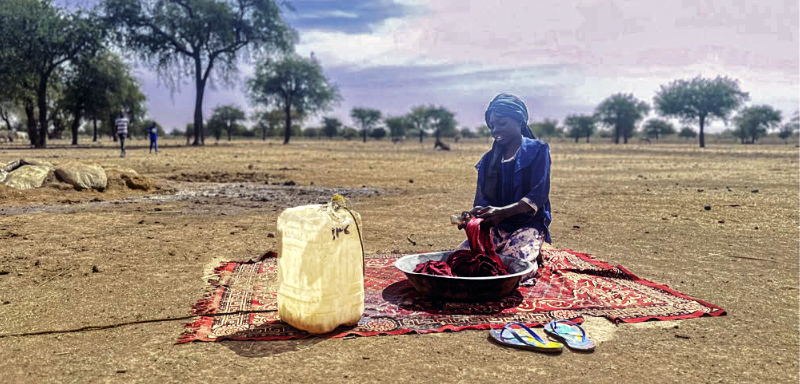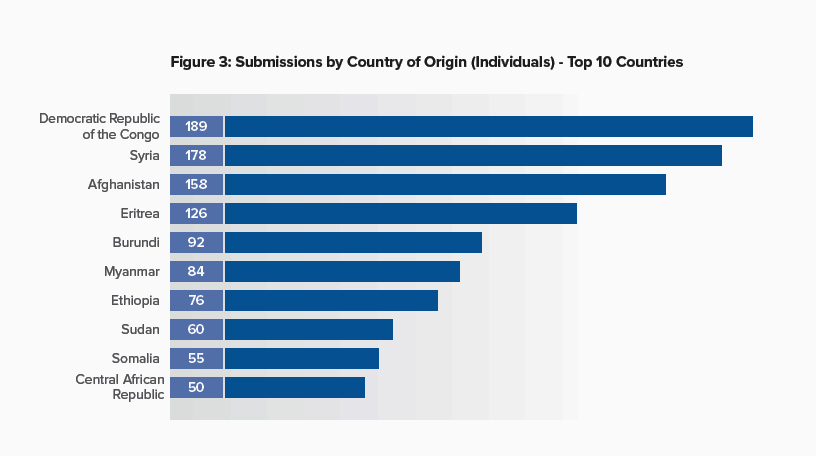Int’l reports flag Sudan as ‘hunger hotspot’

A Sudanese refugee in Chad. (File photo: © UNHCR / Eugene Sibomana)
Sudan has been highlighted as one of the highest concern “hunger hotspots” in three separate reports published by the United Nations High Commissioner for Refugees (UNHCR), the Clingendael Institute of International Relations in the Netherlands, and a joint Food and Agriculture Organisation (FAO) and the World Food Programme (WFP).
The reports conclude that overall, Sudan’s food security outlook remains bleak, with conflict, displacement, and economic instability driving the country towards catastrophic levels of hunger and food insecurity. They caution that the situation demands immediate and coordinated humanitarian efforts to mitigate the crisis, the WFP provides recommendations on priorities for anticipatory action and emergency response.
The UNHCR has warned that the number of refugees in need of resettlement globally will reach 2.9 million in 2025, representing a 20 per cent increase from 2024. In a report titled “Global Resettlement Needs Projected for 2025”, UNHCR revealed that this increase was due to “continuing situations of mass displacement, the emergence of new conflicts, and the impacts of climate change.” According to the report, of the 2.9 million refugees in need of resettlement, 172,000 are Sudanese refugees in need of resettlement.

In a statement, UNHCR Assistant High Commissioner for Protection, Ruvendrini Menikdiwela said: “Resettlement is a vital life-saving intervention for vulnerable refugees and a meaningful response to increasing and unresolved forced displacements.” Resettlement is “an essential part of the pathways-based approach needed to address the scale and complexity of displacement,” she added.
In April, UNHCR announced the completion of two projects funded by $2.2 million from the government of Japan, aiming to meet the urgent needs of refugees, asylum seekers, and host communities affected by the ongoing conflict in Sudan.
From Hunger to Death
The Clingendael Institute reports “a scenario in which the hungriest people are given small amounts of extra food by others leads to an estimated excess mortality of about 2.5 million people (about 15 per cent of the population in Darfur and Kordofan, which are likely worst affected) by the end of September 2024.” – Due in part to the poor cultivation season this year due to the war, which could lead into a “very difficult lean season in 2025”.
The report explores the disruption of logistics and general increases in prices, underlining how “cereal imports are at or below 40 per cent of the level of previous years.”
FAO WFP
According to the FAO WFP report, movements of refugees, returnees and third-country nationals to the Sudan’s neighbouring countries are projected to continue, “… [Migrants] reaching 2.3 million by the end of 2024”.
For neighbouring nations, figures are expected to increase to the end of the year, with the situation in Darfur being catastrophic, Chad faces “A total of 1.2 million people are expected to cross the border… up from the almost 580 000 displaced as of April 2024”.
Similarly, Egypt sees the migration with “a total 371,700 are expected to leave for Egypt… up from 500,000 already displaced in April 2024”.
South Sudan is projected to continue, with the “total 447,500 refugees and third-country nationals, in addition to a total 820,000 returnees, moving to South Sudan by the end of the year, up from 660,356 as of April 2024”. In anticipation for this, one of the recommendations includes “plan for contingency and prepositioning for famine-prone regions, in anticipation of floods, and develop alternate delivery mechanisms to allow physical access in the wet season”. On Thursday, The WFP announced it is urgently expanding its emergency food and nutrition assistance in war-torn Sudan amid the looming threat of famine, as conditions for civilians deteriorate and fighting intensifies in battle zones like El Fasher in North Darfur and Khartoum state.











 and then
and then